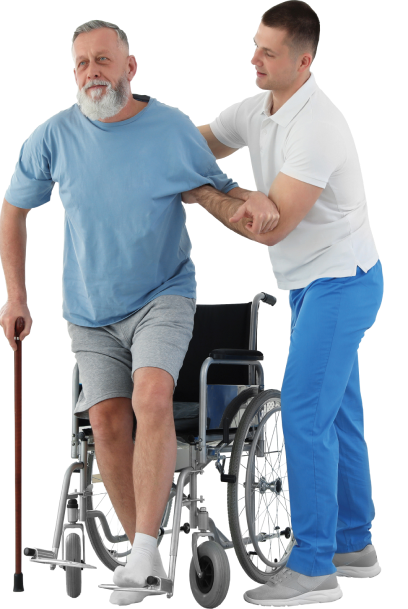Bruce Peterson drove an hour from Riverside County to support his wife of more than 50 years through her lymphadenectomy procedure at the new UCI Health – Irvine hospital.
Peterson, 77, saw her off as she was wheeled into the operating room as one of the first patients admitted on the hospital’s opening day Wednesday, Dec. 10.
And he planned to remain by her side through the night as she recovered in one of the hospital’s 144 inpatient beds.
“I saw the floor for surgery and that was really special,” Peterson said of the hospital’s surgical level, which spans three football fields and now connects with the outpatient Chao Family Comprehensive Cancer Center and Ambulatory Care. “I just want the best for her.”
After trying hospitals and medical professionals in Riverside and San Diego, Peterson said he was recommended to the new hospital because it will be specializing in treating his wife’s condition.
While Peterson was waiting for his wife to come out of surgery, he watched more than a hundred employees gather outside, cheering and clapping, as they readied to work their first shifts at the 350,000-square-foot, all-electric, UCI Health – Irvine.
“A little over four years ago, we broke ground right over there,” UCI Health President and CEO Chad Lefteris said, pointing to the Joe C. Wen & Family Center for Advanced Care and the Chao Family Comprehensive Cancer Center and Ambulatory Care buildings that opened in 2024, just steps from the new acute care hospital.
“But boy, does this sum it up very, very nicely,” Lefteris said, just before the 7:45 a.m. ribbon-cutting.
Visions for the facility date back to the early 1970s, when UC Regents were hoping to build a hospital on the emerging UCI campus. That plan fell through, and, instead, the Orange County Hospital in the city of Orange was purchased in 1976, creating the UC Irvine Medical Center. (That hospital is now called UCI Health – Orange.)
But after four years of construction, the Irvine hospital is now a reality for the university and the area residents who will reap its benefits.
Some of the hospital’s specialities include cancer treatment, cardiology, digestive health, neurosciences and orthopedics.
And the hospital will have its own around-the-clock emergency department.
As part of the lead-up to the hospital’s opening, the OC Health Care Agency, which oversees emergency medical service coordination in the county, signed a contract for the Irvine hospital to join the network of emergency receiving centers and be part of emergency preparedness efforts.
When a patient gets picked up by an ambulance, he or she “gets evaluated by a paramedic in the field who knows which hospitals have specific capabilities such as trauma, stroke, etc.” said Mindy Winterswyk, director of specialized medical services for the county agency, said of how the ER network works.
Those field paramedics then make judgment calls on which hospital to go to, Winterswyk said, based on location and the hospitals’ emergency department activity.
It’s likely patients in the nearby vicinity will be driven to UCI Health – Irvine at the southwest corner of Jamboree Road and Birch Street, with its 20 emergency treatment rooms.
And UCI Health officials said the hospital will be taking most major health insurance plans and Medicare.
Liza Ros, a clinical nurse specialist who worked full-time to onboard the hospital’s some 350 nurses, said she’s most excited for the 75-inch monitors hung in every inpatient room.
For example, Peterson’s wife was expected to spend the night in an inpatient room and would be able to use that monitor to order her meals or watch instructional videos specific to her personal, post-surgery care.
“And when they go home, they can watch those patient education videos too,” Ros said. “And then for us, we can see patient education in their online charts. Everything is integrated.”
Ros said she’s also looking forward to ordering her lunches from the kitchen, whose menu is expected to frequently change to add dishes from different cuisines — “kind of like a nice hotel, like the Marriott.”
These are just some of the many details, Peterson said, that made his time waiting at the hospital a little lighter.
“This was the place that was recommended and that has a reputation for spinal health and what she needs,” Peterson said. “I just want the best for my wife.”

 949.705.6501
949.705.6501




 Service Areas
Service Areas























